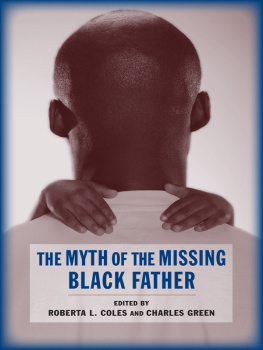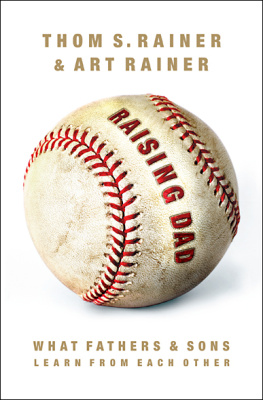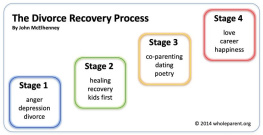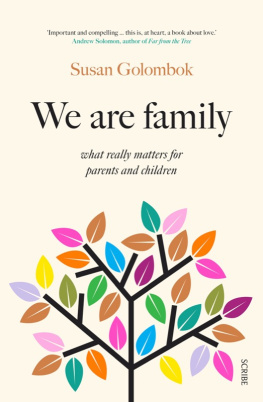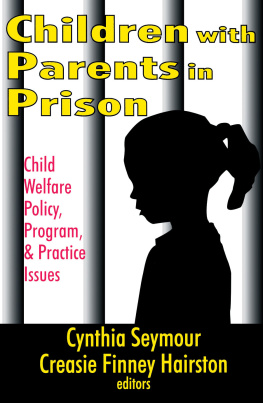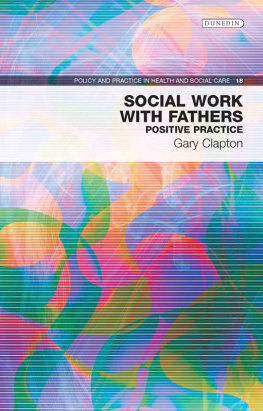Originally published in 1996 by David Popenoe
Published 2009 by Transaction Publishers
Published 2017 by Routledge
2 Park Square, Milton Park, Abingdon, Oxon OX14 4RN
711 Third Avenue, New York, NY 10017, USA
Routledge is an imprint of the Taylor & Francis Group, an informa business
New material this edition copyright 2009 by Taylor & Francis.
All rights reserved. No part of this book may be reprinted or reproduced or utilised in any form or by any electronic, mechanical, or other means, now known or hereafter invented, including photocopying and recording, or in any information storage or retrieval system, without permission in writing from the publishers.
Notice:
Product or corporate names may be trademarks or registered trademarks, and are used only for identification and explanation without intent to infringe.
Library of Congress Catalog Number: 2009003613
Library of Congress Cataloging-in-Publication Data
Popenoe, David, 1932-
Families without fathers : fathers, marriage and children in American society / David Popenoe.
p. cm.
Originally published: Life without father
Includes bibliographical references and index.
ISBN 978-1-4128-1038-8 (alk. paper)
1. Fatherless families--United States. 2. Fatherhood--United States. 3. Fathers-United States. 4. Paternal deprivation-United States. 5. Children of single parents-United States. 6. United States-Social conditions. I. Title.
HQ756.P65 2009
306.856--dc22
2009003613
ISBN 13: 978-1-4128-1038-8 (pbk)
T he fifteen years since this book was written have seen many improvements in modern life in such matters as higher personal incomes, greater longevity, lower rates of crime and delinquency, and even some fathers more involved in child care than their own fathers were. Unfortunately, however, family life has continued to deteriorate. The rate of deterioration has slowed significantly since the tumultuous decades of the 1970s and 1980s, and a few trends, such as the divorce rate, have turned around. But the marriage rate has decreased by another twenty percent, the percentage of unwed births has increased by more than twenty percent, andlinked to these two trendsthe percentage of all couples cohabiting outside of marriage has doubled. An important outcome, with far reaching consequences,is thatlife without father has become a reality for a growing number of American children.
During this period America has clearly awakened to the problem of fatherlessness. Voices publicly speaking out for responsible fatherhood from people such as former presidents Bill Clinton and George W Bush, comedian Bill Cosby, and Barack Obama, have helped greatly to put the issue of fatherhood on the American social and political agenda. Even the left, which once chose to ignore or diminish the issue due to concerns about stigmatizing single parents and appearing to support the return of patriarchy, is no longer so contentious.But most of the new discussion of fatherlessness focuses on the American black community. Fatherlessness is seldom viewed as the endemicand ominouspart of the modern family trend that it is. And, importantly, the main emphasis has been on responsible fatherhood, which typically means that absent fathers should be more responsible, see their children more often and dutifully pay child support.What is omitted in these fatherhood discussions is any mention of the age-old institution that was specifically designed to hold fathers to their children, and to the mothers of those children: marriage. About the continued weakening of marriage there has been a thunderous silence.
The main theme of Families without Fathers is that as marriage declines, fatherhood will inevitably weaken and children will be hurtand this is exactly what is happening today.The great majority of young people still say that they want to marry (someday), marriage has become a prime goal for the gay and lesbian community, and everybody seems to love a wedding. But, in fact, as the trends in marriage, cohabitation, and unwed births indicate, the institution of marriage continues to weaken at an alarming pace.And unless these trends are turned around, no amount of responsible fatherhood talk will ever manage to bring fathers securely and meaningfully back into the lives of their children.
It is not easy to explain precisely why marriage continues to weaken, but it is important to understand that it is weakening in virtually all modem societies, indicating that wide-ranging contemporary cultural currents are to blame. Since the Enlightenment perhaps the single most compelling cultural shift has been in the direction of ever-increasing personal autonomygreater freedom from religion, from the state, from the community, and yes, from the family. The zeitgeist of our age is to want to do our own thing, on our own time; to be recognized as an individual, not as a member of some group. In the case of marriage, if one doesnt find it satisfying, rewarding, fulfilling, empowering, the strong tendency is to get out. Or better yet, to avoid being tied down, not enter into marriage to begin with. Especially in an environment of material affluence, the modern individual has become increasingly able to reject on impulse what is not wanted, and accept only what is felt to be wanted.
Unfortunately, this trend toward personal autonomy can beand has beenover extended. Stable societies rely heavily on strong interpersonal attachments that tend to override personal autonomy. People feel happiest and most self-fulfilled not when they have complete autonomy but when they have strong, trusting connections to otherspeople on whom they can rely. When the drive for personal autonomy strikes at the heart of the family, therefore, overriding the needs and rights of dependents and other adults in the household, it leads inevitably to weakened family structure and widespread family break up. Childrearing becomes compromised, adult attachments are severed, and the social stability that we all count on is undermined.
How can the situation be turned around? There are few motivations in the world, other than self preservation, that are stronger than the devotion of parents to their children. People have a strong propensity to care for their biological offspring. If this were not the case, none of us would be here. Yet the propensity is far stronger in women than in men, making the mother-child bond so prominent in human affairs. Historically, the mother and child usually didnt survive unless they had the provision and protection of a man, and the biological father was the mostly likely to be so inclined. It was in order to strengthen this three way biological tie, the so-called natural family that included the father, that societies developed, promoted, and regulated the institution of marriage. In other words society, in its wisdom, has recognized that in order to hold the father to the mother and child a cultural tie had to be developed where a biological tie was weak.
Today, fathers are not needed for the physical survival of mothers and children, and the cultural tie of marriage has withered. But fathers still are needed, based on all of the evidence discussed in


